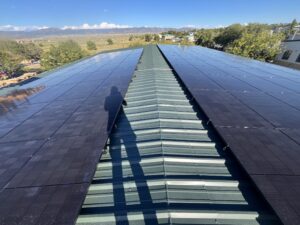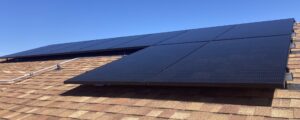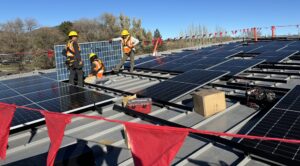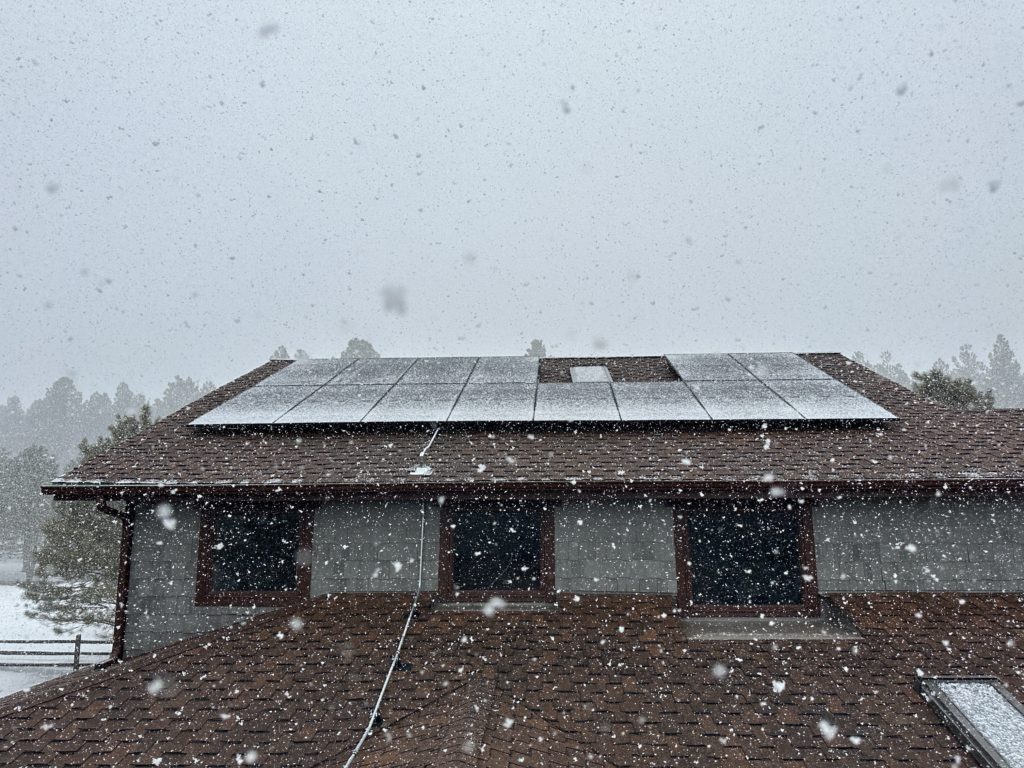
Going solar is the best way to take charge of your home’s energy production and use. It allows you to take advantage of the changing energy potential and need year-round.
During the winter months, you may notice a sizable drop in production, and if it is your first time around, you may be reasonably concerned. You can rest assured, however, that this is perfectly a normal part of the year-round plan for production, and that seasonality has been taken into account in your system’s design.
Read on to find out why solar production is lower in the winter, and higher in the summer, how concerned you should be about snow, and what you can do to mitigate any issues.
Lower Production in the Winter
Solar panels produce less in the winter than in the summer for three main reasons. In the winter, the days are shorter, the sun hits the panels at a more indirect angle, and the sunlight is less intense. In Flagstaff, on the winter solstice, we only have 9.75 hours of daylight, and on the summer solstice, we have nearly 15 hours of daylight. There is about 48% more sun in the summer!
Sunlight is weaker in the wintertime. In the winter, the northern hemisphere is tilted away from the sun, and the sun’s rays have to travel further through the atmosphere to reach the ground (imagine a shallow water dive into a pool – you pass through more water before touching the bottom than if you did a pencil dive).
Traveling through the atmosphere weakens the sunlight, so a longer path through the atmosphere in winter means weaker sunlight.
Bonus fact: this is why it’s easier to get sunburnt at higher elevations – it’s not that you are “closer to the sun”, it’s that there is less atmosphere between you and the sun!
Finally, solar panels make the most power when the sunlight is shining directly on them. The majority of the roofs we install in Northern Arizona are low-slope roofs, which means that the sun needs to be quite high in the sky in order to be shining directly on them. In the winter, the sun is lower in the sky and never gets high enough to shine directly on the solar panels.
Year-Round Planning
These seasonal factors are taken into account in the initial planning and design of your system, so this is not ‘lost’ energy. The production estimate comes from a model that uses a dataset called the Typical Meteorological Year dataset. 65% of solar production is done from March to September, with only 35% coming from the rest of the year. This is why it is important to go with a solar company like Rooftop Solar which uses historical weather data in your exact area to predict these things.
Take a look at the following graph:
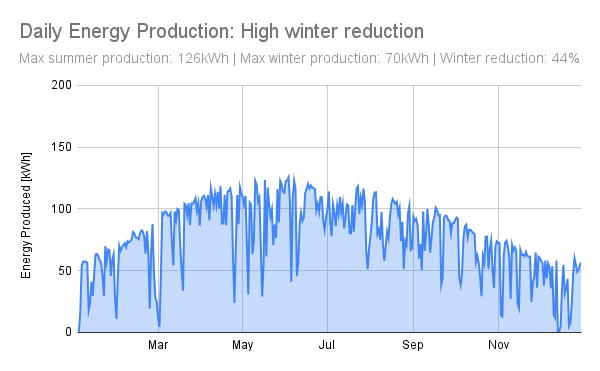
This graph shows how stark of a difference in production in the winter and summer months can be from the same system, in this case, a 44% difference. This is a perfectly functioning system which performed above expectation in the year shown.
What About Snow?
Snow is considered to have a limited effect because of the same year-round planning, but can temporarily prevent solar production. Thankfully, most of the time, snow on top of panels will be gone very quickly. This is due to the combination of hot panels, a slick surface, and the pitch of the roof. Rain and snow storms themselves are also of little concern with regard to the solar as they are tested in such conditions rigorously.
If a large amount of snow has accumulated, using a soft snow roof rake with an extendable arm from the ground will be a good option. But be gentle! Don’t try to scrape the panels like you would scrape your car windshield. Once the bulk of the snow has been removed, the last bit of snow and ice will melt away quickly.
As for snow guards, they will not improve the production of a system (if anything, they will likely decrease production). They prevent the snow from sliding off an array all at once – so they are mainly installed if an array is located directly over a front door / regularly used entrance into the home.
Monitoring Your Production
Take a look at the following graphics:
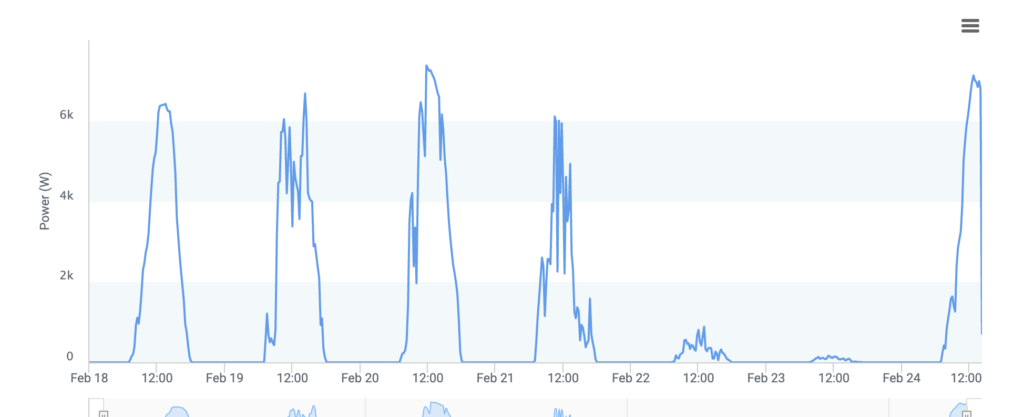
This graph shows the production of a system in Flagstaff, with very little production on 2/22 and 2/23.
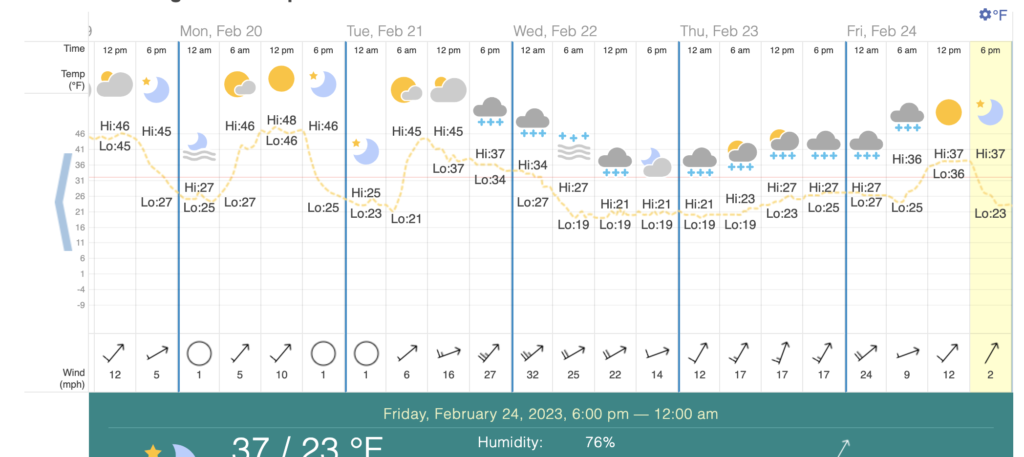
When we compare this to a weather report, we see that Flagstaff experienced snowstorms and very little sunshine on these two days (timeanddate.com).
Solar monitoring and these kinds of reports are available within the Enlighten platform from Enphase, and software is available from our other inverter manufacturers, as well. Solar monitoring software platforms like these should be used as a reference point to see if decreased winter production can be correlated to recent storms like the one above. If breaks in production are frequent or consistent and don’t correspond with storms, then the homeowner should let their installer know.
You should also call in if the solar panels are clear of ice and snow and still not producing. If you have had your solar for more than a year, and it is producing less in the summer than it did in prior years, you should contact your installer. Experienced installers like Rooftop Solar can evaluate the data in these cases to see if there is anything out of the ordinary.
A Solution With Solar
In conclusion, winter production decreases are normal because of shorter days, the sun hitting the panels at a more indirect angle, and the sunlight being less intense. Most importantly, all of these factors are taken into account in the initial planning of the system. Snow is less of a concern than people may think but there are a few things you can do to mitigate it.
Understanding how solar works is very important to understanding how low winter production is accounted for. Reach out today to find out what solar will look like for you!
